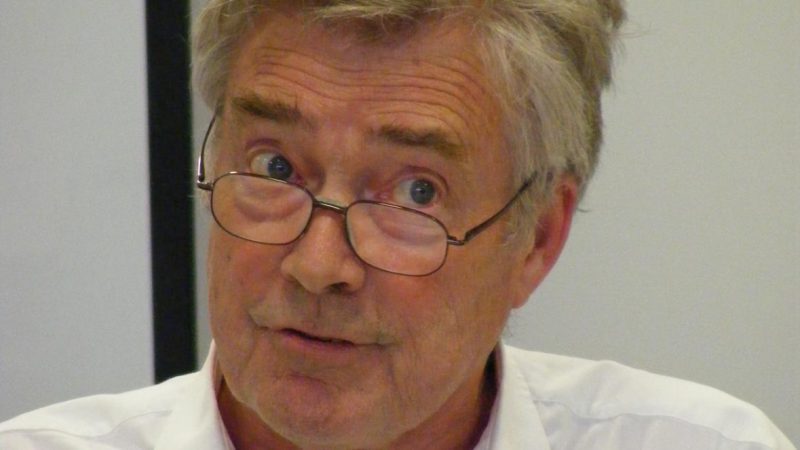
Covid-19 has exacerbated the social exclusion already experienced by those amongst us who live with disability or ill health, and brought particular suffering to Black, Asian and minority ethnic communities. Across the Labour and trade union movement, frontline workers delivering health, care, transport, retail and education services have endured searing personal loss. Many others in our membership will feel the devastating impact of the pandemic for years.
Highlighting the death from Covid of a lifelong Labour supporter may seem counter-intuitive to encouraging hope, which for so many right now feels in short supply. But the reflections below on the life of Julian Robinson, who died in April, I hope will inspire all. They show how much one individual – powered by a principled determination to make the world a better, safer, place – can achieve.
The following comes from a eulogy given by George Papandreou (MP and former Prime Minister of Greece) at an online memorial to Julian Robinson held on June 4th by members of Symi, an annual symposium of intellectuals, politicians, Nobel laureates, scientists and activists of which Julian Robinson was a member.
These words are reproduced with the kind permission of Mr Papandreou and Mary Kaldor – Labour activist and peace campaigner, herself an internationally renowned professor at the LSE and Julian’s life partner of over 50 years.
In the strangest of times, our family lost a very special human being… We have all wished to honour his life and his legacy. To attempt, in these virtual moments, to capture the essence of who Julian has been, what he has stood for, his remarkable achievements.
Julian Perry Robinson. Born in Jerusalem in 1941. The year that Hitler began Operation Barbarossa – the invasion of Russia. The year when the Blitz targeted Britain’s major cities. When Japan attacked Pearl Harbour and the US entered the War.
Julian Perry Robinson, left us, in 2020, just as the world was hit – paralysed by the worst catastrophe since the second World War, the pandemic of Covid-19. Julian’s life was associated with big moments of history. But in many ways, he was also a prometheus. One with forethought of what is to come.
He devoted his life work to protect humanity from the destruction that could be wrought by biological and chemical weapons. As a key advisor to the World Health Organisation, his report was a strong voice for the strengthening of disease surveillance in public health as well as highlighting the need for a robust global health system. Yet in an irony suited only to Greek tragedies, he was one of the many victims of this malicious virus.
I’ve been both deeply impressed and moved by Julian’s achievements, commitment and struggle to better humanity. Yet his soft-mannered presence at our gatherings gave me no clue as to his remarkable work.
Today, as he has left us, he emerges as a role model, one of an anti-hero, in the academic world. Key to the negotiations on the Biological Weapons Convention and the 1993 Chemical Weapons Convention.
His colleagues at the Stockholm International Peace Research Institute (SIPRI) said that he had “an unparalleled influence in the shaping and implementation of the international conventions that have helped prevent chemical and biological warfare from breaking out during our lifetime”.
He wrote a masterpiece, six-volume study on ‘The Problem of Chemical and Biological Warfare‘. And he first warned of the creeping use of chemical weapons by military establishments as well as in the conflicts experienced in the Balkans, Afghanistan, Africa and recently in Syria.
Aristotle might have concluded that he had the three elements of the best of politics. Scientific knowledge on the one hand; a rational yet wise approach to enforcing the implementation of international law – as in the famous incident of the “yellow rain” when he was able to diffuse a conflict between the US and the Soviet Union; but also emotion, pathos, a courage in expressing his indignation and sense of injustice, as he pushed for dialogue and international cooperation.
He was considered for a Nobel Prize in 2013 but he suggested it would be better to give this Award to the ‘Organization for the Prohibition of Chemical Weapons’. A rare example of selflessness, avoiding the hubris of those caught up in their narcissism or sense of genius. What a contrast to so many who today like to call themselves leaders in this world.
I regret we did not hear more of his voice, not only on the all-important subject of warfare but also of his hobbies – classic sports cars, English pubs and cooking.
I myself, I am sure all of us, have had time to reflect during this pandemic. The small things in daily life, the deep friendships, the simple things we often overlook, took on more beauty and more meaning in my life. Lives so fleeting in the eons of time. Somehow, thinking back at our shared moments with Julian, it seems he knew these meanings, and this, long before the pandemic took him away from us all.
Obituaries to Julian Robinson appeared also in The Times and The Guardian.




More from LabourList
Almost half of Labour members oppose plans to restrict jury trials, poll finds
‘How Labour can finally fix Britain’s 5G problem’
‘The University of the Air – celebrating 60 years of Harold Wilson and Jennie Lee’s vision’